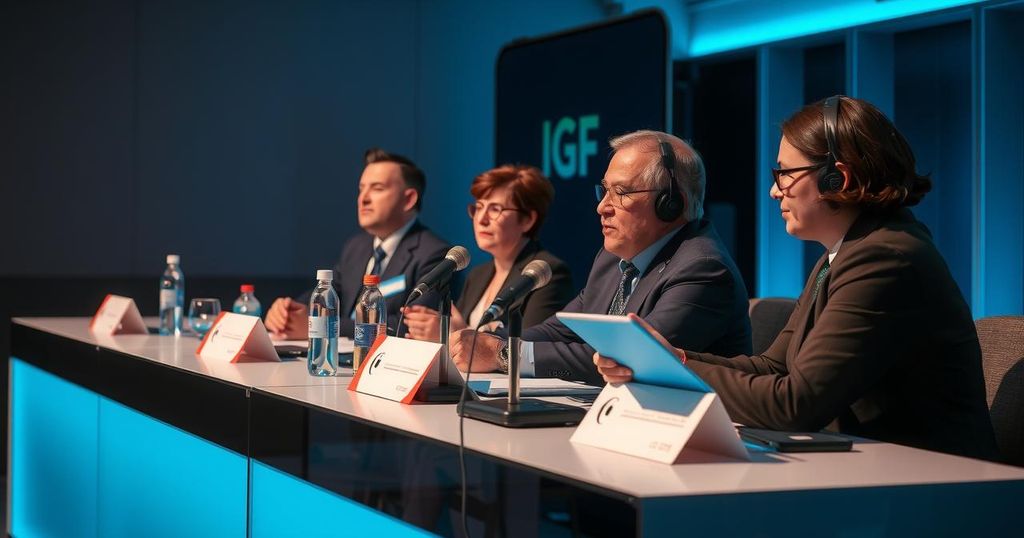Politics
ACCOUNTABILITY META, AFRICA, DEMOCRACY, DIGITAL WATCH OBSERVATORY, GOVERNANCE, GOVERNMENT, ICT AFRICA, IGF, INTERNET GOVERNANCE FORUM, LINA VILTRAKIENE, MEDIA, MEDIA MONITORING AFRICA, NATIONAL SECURITY, OREMBO, POLITICS, SOUTH, TA, TAWFIK JELASSI, UNESCO, WATCH OBSERVATORY, WILLIAM BIRD
Jamal Walker
0 Comments
Election Integrity in the Digital Era: Insights from IGF 2024
The IGF 2024 panel addressed election integrity amidst rising disinformation and technological threats. Experts emphasized the urgent need for collaborative solutions to combat misinformation and ensure public trust, particularly during a year of significant global elections. The discussions highlighted the challenges faced by vulnerable populations and the responsibility of various stakeholders to uphold democratic processes against digital manipulations.
At the Internet Governance Forum (IGF) 2024, a panel of experts convened to discuss the critical issue of election integrity in light of advancing digital technologies and the resurgence of misinformation. The session highlighted the tumultuous landscape of elections, particularly in a year marked by an unprecedented number of global elections, termed a ‘super election year.’ The panel pointed to the urgent need for collaborative efforts to combat the threats posed by disinformation, AI deepfakes, and other malicious tactics employed by individuals aiming to influence democratic processes.
Tawfik Jelassi from UNESCO drew attention to the alarming rise of disinformation, emphasizing its role as a fundamental global risk. He stated, “Without facts, there is no trust, and without trust, democracy falters.” Moreover, the discussions revealed the alarming trend where misinformation circulates at a pace tenfold faster than verified content, significantly undermining public trust in electoral systems. Additional insights from William Bird of Media Monitoring Africa and Lina Viltrakiene of Lithuania’s government further underscored how digital platforms are exploited to mislead and misinform voters through deceptive practices, including deepfakes.
Addressing the digital divide, Elizabeth Orembo of ICT Africa highlighted the heightened vulnerability faced by populations in the Global South, where unequal access to information exacerbates the impact of disinformation. She remarked, “We cannot apply blanket policies from tech companies without addressing regional contexts,” advocating for localized approaches that consider infrastructural and cultural differences.
During the session, Sezen Yesil of Meta shared the company’s initiatives to mitigate threats associated with election integrity, including stricter regulations against fake accounts and fostering transparency in political advertising. While concerns remain regarding AI-generated disinformation, she noted that the expected influence of generative AI during the 2024 elections would be modest. The panel reinforced the need for enhanced accountability measures for technology companies, calling for comprehensive legal frameworks akin to the EU’s Digital Services Act to effectively combat digital misinformation and manipulation.
The session emphasized the necessity of multistakeholder collaboration, underscoring the view that ensuring election integrity is a collective responsibility involving governmental bodies, civil society, academia, and the tech industry. Rosemary Sinclair from Australia’s AUDA remarked, “Safeguarding democracy is a global team sport,” reiterating the IGF’s vital role in facilitating collaborative efforts across various sectors. Participants unanimously agreed that ongoing efforts are crucial beyond election timelines to reinforce public trust, address digital inequities, and establish protective frameworks that promote democracy in a rapidly evolving digital environment.
The IGF serves as an essential platform for fostering global dialogue and actionable strategies to enhance governance related to election integrity, with calls for its influence to be strengthened in shaping future solutions.
The discussions surrounding election integrity in the digital era are increasingly pertinent as misinformation and disinformation proliferate, significantly challenging democratic processes. The IGF 2024 panel aimed to tackle these issues by bringing together experts to evaluate the implications of these threats while focusing on collaborative solutions. The backdrop of this discussion includes over 65 elections worldwide during a particularly dense electoral cycle, which intensifies the urgency to protect electoral integrity amidst the challenges posed by emerging technologies and the digital landscape.
In summary, the discussions at the IGF 2024 reinforced the imperative need for a collective response to safeguard election integrity in the digital age. The panel’s insights illuminated the profound threats presented by misinformation, AI deepfakes, and the digital divide, particularly in vulnerable regions. Collaborative frameworks involving all stakeholders were deemed essential not only for the success of upcoming elections but also for the maintenance of democratic trust in a rapidly digitizing world.
Original Source: dig.watch




Post Comment